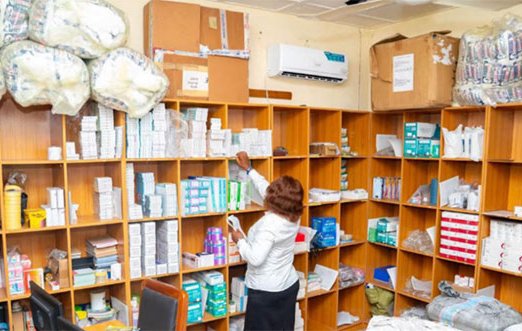Kampala | Africa’s dependence on imported medicines continues to expose the continent’s fragile healthcare systems, with over 70% of its medical supplies sourced from abroad, according to a recent report by the African Union Development Agency (AUDA-NEPAD).
Although Africa accounts for 25% of the global disease burden and only 18% of the world’s population, it produces a mere 3% of global medicines. The report, titled “24 Priority Medical Products and Roadmap for Regional Manufacturing in Africa”, released in January 2025, highlights the urgent need for self-reliance in pharmaceutical production. It outlines practical steps to scale up local manufacturing of essential medicines, vaccines, and health products that are critical to public health, especially as Africa’s population and disease challenges continue to grow.
The COVID-19 pandemic exposed the continent’s vulnerability when major medicine-exporting countries such as China and India imposed export restrictions to prioritize domestic needs. By March 2020, more than 50 countries had limited exports of medicines and medical supplies, leaving Africa facing severe shortages of essential drugs including antibiotics, antimalarials, and cancer treatments.
Currently, Africa imports about 95% of its active pharmaceutical ingredients—the key components that make medicines effective mainly from India and China. This dependence has made local production expensive and left the continent vulnerable to supply disruptions and fluctuating foreign prices. For instance, in South Africa, a six-month course of the cancer drug capecitabine costs about US$2,200, reflecting the broader affordability crisis in accessing treatment across the region.
Experts argue that producing active pharmaceutical ingredients locally would reduce costs, strengthen local economies, and create jobs. Cloudius Ray Sagandira, Principal Researcher at the Council for Scientific and Industrial Research, emphasizes the importance of developing agile, cost-effective, and Afrocentric processes for medicine production. In a 2024 study published in Reaction Chemistry & Engineering, Sagandira and co-author Sinazo Nqeketo explored continuous flow manufacturing, a modern production method that allows for faster, safer, and more consistent output with less waste. They note that a blend of traditional and modern technologies tailored to Africa’s unique needs will be crucial in building a resilient pharmaceutical industry.
Across the continent, several companies are leading this transformation. Emzor Pharmaceuticals and Fidson Healthcare in Nigeria, Aspen Pharmacare in South Africa, Eva Pharma in Egypt, and Dei BioPharma in Uganda are taking bold steps toward strengthening local production capacity. Governments in Kenya, Ghana, South Africa, and Nigeria have also begun investing in public-private partnerships to promote pharmaceutical manufacturing.
The African Development Bank estimates that around US$11 billion will be needed by 2030 to build a competitive local pharmaceutical industry. Its 2030 Continental Pharmaceutical and Vaccine Manufacturing Vision and Action Plan aims to enhance production capacity, improve regional logistics, set quality standards, and expand research and vaccine production across the continent.
In 2023, Emzor Pharmaceuticals secured €14 million from the European Investment Bank to establish an active pharmaceutical ingredient plant in Nigeria with a projected capacity of 400 metric tonnes per year. Although the completion date has been revised to late 2025 due to economic pressures, the facility represents a major step toward Africa’s pharmaceutical self-reliance. Meanwhile, South Africa has established FuturePharma, an open-access facility at the Council for Scientific and Industrial Research, to support companies through research, development, and training.
Universities and research institutions across Africa are also contributing to this vision by advancing technologies that make local production more sustainable and cost-effective. Experts say the continent’s pharmaceutical independence depends on sustained investment, reliable infrastructure, and skilled personnel. They recommend that governments provide tax incentives, improve electricity supply, and support technical training to encourage growth in the sector.
Skills development initiatives such as the CSIR Workforce Development Programme and the African STARS Fellowship hosted by Stellenbosch University and Institut Pasteur de Dakar are helping train the next generation of pharmaceutical scientists. These programs equip young professionals with technical and leadership skills needed to drive local medicine and vaccine production.
“With growing partnerships, modern technologies, and increased investment, Africa can build a future where every country produces its own affordable, high-quality medicines,” said Sagandira.
